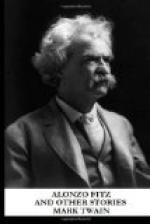My hearers, we have sad cause to remember the man of the 13th January. The results of the vast crime of the 13th January have been in just proportion to the magnitude of the set itself. But for it there had been no 30 November—sorrowful spectacle! The grisly deed of the 16th June had not been done but for it, nor had the man of the 16th June known existence; to it alone the 3d September was due, also the fatal 12th October. Shall we, then, be grateful for the 13th January, with its freight of death for you and me and all that breathe? Yes, my friends, for it gave us also that which had never come but for it, and it atone—the blessed 25th December.
It may be well enough to explain, though in the case of many of my readers this will hardly be necessary. The man of the 13th January is Adam; the crime of that date was the eating of the apple; the sorrowful spectacle of the 30th November was the expulsion from Eden; the grisly deed of the 16th June was the murder of Abel; the act of the 3d September was the beginning of the journey to the land of Nod; the 12th day of October, the last mountain-tops disappeared under the flood. When you go to church in France, you want to take your almanac with you—annotated.
LEGEND OF SAGENFELD, IN GERMANY
—[Left out of “A Tramp Abroad” because its authenticity seemed doubtful, and could not at that time be proved.—M. T.]
More than a thousand years ago this small district was a kingdom —a little bit of a kingdom, a sort of dainty little toy kingdom, as one might say. It was far removed from the jealousies, strifes, and turmoils of that old warlike day, and so its life was a simple life, its people a gentle and guileless race; it lay always in a deep dream of peace, a soft Sabbath tranquillity; there was no malice, there was no envy, there was no ambition, consequently there were no heart-burnings, there was no unhappiness in the land.
In the course of time the old king died and his little son Hubert came to the throne. The people’s love for him grew daily; he was so good and so pure and so noble, that by and by his love became a passion, almost a worship. Now at his birth the soothsayers had diligently studied the stars and found something written in that shining book to this effect:
In Hubert’s fourteenth year a pregnant event will happen; the animal whose singing shall sound sweetest in Hubert’s ear shall save Hubert’s life. So long as the king and the nation shall honor this animal’s race for this good deed, the ancient dynasty shall not fail of an heir, nor the nation know war or pestilence or poverty. But beware an erring choice!
All through the king’s thirteenth year but one thing was talked of by the soothsayers, the statesmen, the little parliament, and the general people. That one thing was this: How is the last sentence of the prophecy to be understood? What goes before seems to mean that the saving animal will choose itself at the proper time; but the closing sentence seems to mean that the king must choose beforehand, and say what singer among the animals pleases him best, and that if he choose wisely the chosen animal will save his life, his dynasty, his people, but that if he should make “an erring choice”—beware!




